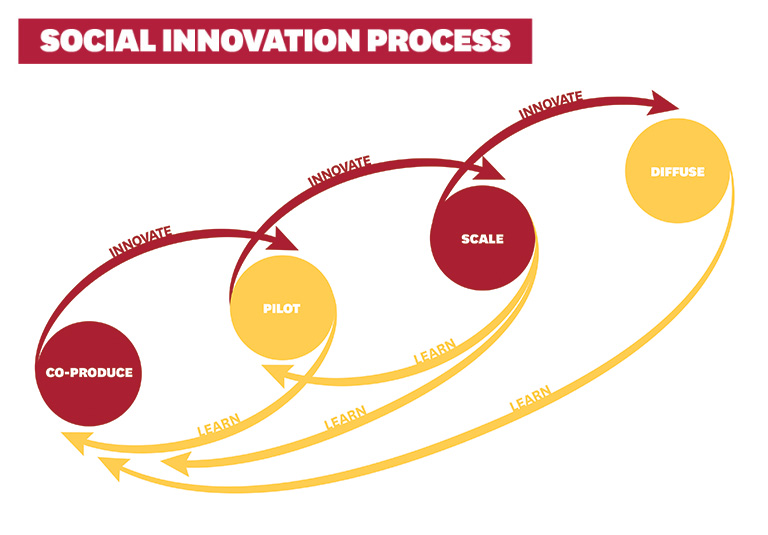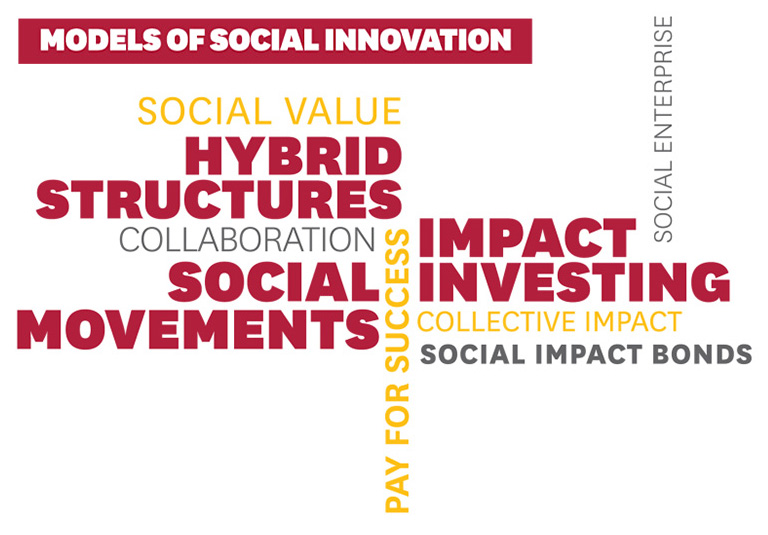What Is Social Innovation?
Traditional policy approaches have failed to catalyze significant and lasting change for many complex social problems, such as homelessness, justice involvement and reentry, and educational achievement. Social Innovation is a novel process or product that intends to generate more effective and just solutions to address complex social problems, for collective gain (Beckman, Rosen, Estrada-Miller, and Painter, 2023), and provides an alternative to traditional problem solving approaches. The Price Center conducts research on all aspects of social innovation, which offers both new processes and new models for solving society’s most persistent social challenges.
Read A Conversation on Social Innovation: Christine Beckman and Tara Roth
Explore Specific Research Concentrations

Social innovation uses a flexible, responsive approach built upon an iterative process of concurrent problem identification, design, implementation, and evaluation of pilot programs and other test strategies, with the ultimate goal of diffusing new practices into systems change.

Social innovation includes a wide range of new organizational structures, financial tools, and partnership models that are more effective, equitable, and sustainable than existing problem solving approaches.
Explore a selection of the Price Center’s contributions to the field of social innovation
The Social Innovation Trap: Critical Insights into an Emerging Field
We present an integrative approach to social innovation research to build a unified understanding of this emerging field. Based on a systematic literature review of articles about social innovation published in top-tier journals from 2003 to 2021, we argue that a “social innovation trap,” resulting from disciplinary silos, has limited our inquiries thus far. We contend that the social innovation trap has led the field to overlook three key insights. First, fragmentation across disciplines obscures the particular advantages of different sectors to social innovation. Second, the dominance of management within the social innovation field has led us to ignore the extent to which social innovation is embedded in space and place, which makes scale a fundamental dimension in need of exploration. Third, the management bent within social innovation scholarship has favored market perspectives over more democratic approaches. We call attention to two competing schools of thought—the instrumental and democratic perspectives—that open the field to broader inquiries into the role of innovation, knowledge, participation, and outcomes in social innovation. We conclude by delineating a research agenda that incorporates these three insights, to build the foundation for a more comprehensive social innovation field.
From Citizen-Control to Co-Production: Moving Beyond a Linear Conception of Citizen Participation
Co-production recognizes that truly inclusive community development requires adaptive and enduring processes to address the political and economic power inequalities that shape local decision-making. This paper describes a Coachella Valley-based initiative’s evolution toward a co-production model of community engagement.
What is Collective Impact
Society is full of complex social issues that prove challenging for any single entity to solve on its own. The collective impact framework calls for organizations to work toward a common goal.
What is Pay for Success
Pay for Success (PFS) is an innovative approach to contracting social services that ties payments for service delivery to the achievement of a predetermined, measurable outcome.
Are Social Impact Bonds an Innovation in Finance or Do They Help Finance Social Innovation?
Outcomes Based Commissioning (OBC) has been suggested as a way to provide ‘more’ social services for ‘less’ public resources. Such commissioning is often linked with an innovative financing tool called a Social Impact Bond (SIB). Using data from the Social Finance UK Database and focusing on SIBs in the US and UK, this paper evaluates whether the SIB approach aligns with the theoretical predictions of social innovation.






